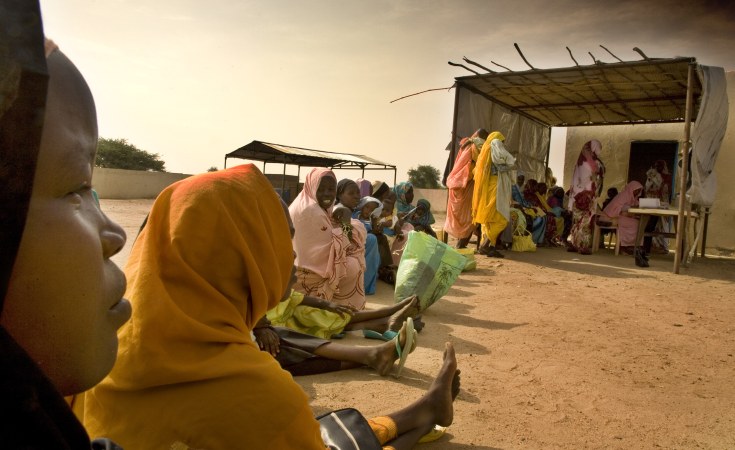On 7-8 April, donors will meet to discuss ways of reconstructing and developing Darfur. But unless root causes are addressed, aid will struggle to make a difference.
Darfur desperately needs help - but not just to repair damage from the horrific conflict that erupted in 2003, killing 300,000 people, destroying hundreds of villages and pushing 2 million people to camps inside Darfur and across the Chadian border. Darfur also desperately needs to overcome the marginalisation and underdevelopment that helped fuel the conflict.
This weekend, delegates from donor countries and financial institutions will be meeting in Doha, Qatar, and are expected to pledge support for an ambitious development strategy in Darfur. So why are so many Darfuris, and Darfur activists, uneasy?
Perpetuating woes
Firstly, the armed conflict is not over. The Sudanese government is still using its army, air force, and still-intact militia - including janjaweed - in its counter-insurgency operations against rebel groups and its abusive attacks on the ethnic communities they accuse of supporting the rebels.
Lawlessness and the proliferation of arms have made communal conflicts, in which government forces often participate, more lethal. These have resulted in hundreds of deaths and displaced more than 100,000 people this year alone.
Secondly, vast parts of Darfur are not accessible to peacekeepers or aid workers. The African Union/United Nations peacekeeping mission, UNAMID, cannot visit the majority of areas where violence has occurred to help protect civilians and monitor the abuses.
This is not just due to security problems, but also because the government restricts access for independent monitors and observers. Although Sudan recently said it has streamlined access requirements, many observers remain dubious whether it will truly open up.
The third problem is the Sudanese government's repressive policies. The government uses national security laws to harass and detain suspected rebels and their presumed supporters, including students, for long periods without judicial review or charge.
And then there's accountability. The government has done nothing to provide justice for victims of the most serious abuses during the conflict - including for any of the government's own attacks on villages.
With a few exceptions, the authorities shield members of government forces from prosecution and have ignored the warrants for the arrest of President Omar al-Bashir and others from the International Criminal Court.
Under these circumstances, it is difficult to see how the 155-page Developing Darfur: A Recovery and Reconstruction Strategy - which includes everything from building roads, schools, and clinics, to agricultural schemes, to the tune of $7 billion - can be meaningfully implemented.
As the World Bank itself has noted, countries mired in violence are where people face the worst failures of development. In a 2011 report about development in conflict areas, the World Bank notes how crucial security, justice, and jobs are to break the cycles of violence.
Developing Darfur?
The aims of the conference are, of course, admirable. In addition to supporting recovery and development projects, it will draw attention to Darfur, which has slipped out of the limelight, and could breathe life into the Doha Document for Peace in Darfur - the 2011 peace agreement signed by the government and one rebel group. Support for the development strategy, it is hoped, will attract more support for - and signatories to - the peace deal.
Long-suffering Darfuris deserve the international solidarity and generosity, but there are real concerns that funds will not improve human rights. Money can't buy the reforms needed to make the strategy's vision of respect for human rights and the rule of law come true.
Only Sudan's government can rein in its forces, disarm militia, hold abusers accountable, stop bombing and attacking civilians, and end its repressive policies. Only the government can grant the UN and aid groups the unfettered access they need.
All of those steps are set out in countless UN Security Council Resolutions and incorporated into benchmarks such as those put forward by the UN Group of Experts for improving the human rights situation. But Sudan has repudiated external efforts to change its behaviour and implemented almost none of them.
International donors rightly want to see sustained development and respect for basic rights in Darfur.
They should not accept partial, politicised development, nor should they ignore ongoing rights abuses or the pressing humanitarian needs that still exist. Instead, donors should lean hard on their beneficiary government and insist on long-demanded reforms and better human rights conditions.
They should insist on full access to Darfur, transparency in the management and oversight of the funding, and independent monitoring to ensure that funds promote real improvements in the human rights situation and don't contribute to continuing repression.


